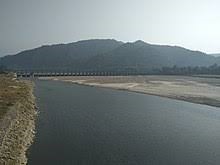Free Courses Sale ends Soon, Get It Now


Free Courses Sale ends Soon, Get It Now



Disclaimer: Copyright infringement not intended.
Context
Details
About
Location
Origin
Mouth of the Bagmati River
Basin features of Bagmati River
Tributaries
|
PRACTICE QUESTION
How many of the above statements is/are incorrect? A) Only one B) Only two C) All three D) None Answer: A |
https://riversgraphy.com/bagmati-river/
© 2024 iasgyan. All right reserved